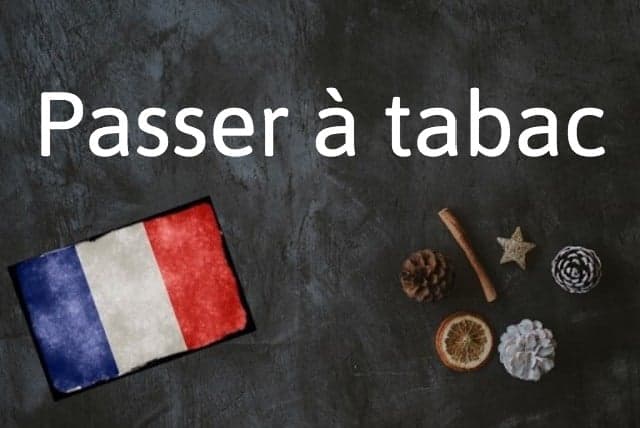French expression of the day: Passer à tabac

Confusingly, this has nothing to do with shops or smoking.
Why do I need to know passer à tabac?
Because it's all over the news right now and can be quite confusing if you translate it directly.
What does it mean?
Passer means ‘to pass’ and a tabac is usually known in France as the local corner store that sells tobacco, magazines and candy. Often the tabac is equipped with a coffee stand and bar with a TV showing the news or today’s horse race.
READ ALSO: Why the tabac is essential to life in France - even if you don't smoke
However, passer à tabac has nothing to do with passing by the tabac to get some smokes.
Passer au tabac really means 'to violently beat someone up'. Other English equivalents are 'to kick in', or 'to beat to a pulp'.
You might have heard it on French radio or read it in the news today, as it's been widely used by French media to describe a video showing police beating up a music producer in Paris last Saturday.
In this case, the term often used is le passage à tabac, so 'the beating up of', referring to the incident that happened.
Une pluie de coups et des mensonges : retour sur le passage à tabac du producteur de musique Michel Zecler par trois policiers https://t.co/7wqINmzKHr
— Le Monde (@lemondefr) November 27, 2020
Origins
Oddly for such a distinctive phrase, there's no agreed explanation on how the blameless tabac came to be associated with a violent assault.
Back in the day, French sailors would use a coup de tabac to refer to strong wind gusts at sea.
According to online dictionary Internaute, tabac took the meaning of coup (a punch) sometime in the 15th century, but it doesn't say exactly how it turned into the full expression passer à tabac.
It may have something to do with the similar-sounding tabasser - ‘to beat up’ or 'clobber'.
Use it like this
Il y a eu un passage à tabac juste à l'extérieur de mon appartement cette nuit. J'ai du appeler la police. - Someone was beaten up just outside my flat last night. I had to call the police.
Jean s'est fait agressé dans la rue. Trois mecs l'ont passé à tabac parce qu'ils n'a pas voulu leur donner son portable. - Jean was assaulted on the street. Three guys beat him to a pulp because he didn't want to give them his cellphone.
On ne peut plus tolérer les passages à tabac de la part des forces de l'ordre. - We can't tolerate incidents where police beat people up anymore.
Synonyms
Frapper - to punch
Tabasser - beat up
Rouer des coups - beat up
Comments
See Also
Why do I need to know passer à tabac?
Because it's all over the news right now and can be quite confusing if you translate it directly.
What does it mean?
Passer means ‘to pass’ and a tabac is usually known in France as the local corner store that sells tobacco, magazines and candy. Often the tabac is equipped with a coffee stand and bar with a TV showing the news or today’s horse race.
READ ALSO: Why the tabac is essential to life in France - even if you don't smoke
However, passer à tabac has nothing to do with passing by the tabac to get some smokes.
Passer au tabac really means 'to violently beat someone up'. Other English equivalents are 'to kick in', or 'to beat to a pulp'.
You might have heard it on French radio or read it in the news today, as it's been widely used by French media to describe a video showing police beating up a music producer in Paris last Saturday.
In this case, the term often used is le passage à tabac, so 'the beating up of', referring to the incident that happened.
Une pluie de coups et des mensonges : retour sur le passage à tabac du producteur de musique Michel Zecler par trois policiers https://t.co/7wqINmzKHr
— Le Monde (@lemondefr) November 27, 2020
Origins
Oddly for such a distinctive phrase, there's no agreed explanation on how the blameless tabac came to be associated with a violent assault.
Back in the day, French sailors would use a coup de tabac to refer to strong wind gusts at sea.
According to online dictionary Internaute, tabac took the meaning of coup (a punch) sometime in the 15th century, but it doesn't say exactly how it turned into the full expression passer à tabac.
It may have something to do with the similar-sounding tabasser - ‘to beat up’ or 'clobber'.
Join the conversation in our comments section below. Share your own views and experience and if you have a question or suggestion for our journalists then email us at [email protected].
Please keep comments civil, constructive and on topic – and make sure to read our terms of use before getting involved.
Please log in here to leave a comment.